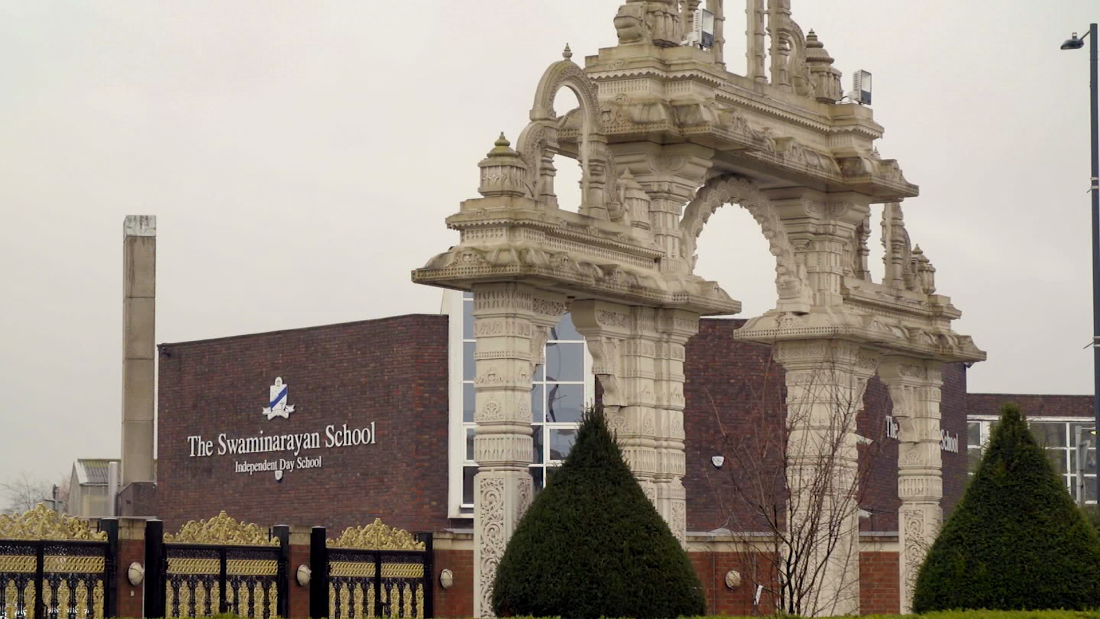
This public vaccination clinic is Patel’s passion project, set up in a school on the grounds of London’s Neasden Temple, the largest Hindu place of worship in Europe.
“Since I go to the temple, it has special meaning to me,” said Patel, a local health manager. “It’s about bringing the clinic to the community and serving the community that I belong to.”
According to the UK Office for National Statistics (ONS), from March 1 to June 30, 2020, Brent had the highest overall age-standardized Covid-19 mortality of any local authority in England and Wales.
Patel says that as a primary care worker, she has seen systemic inequalities continue to emerge during vaccine rollouts in the UK.
“If someone is concerned, it is very important that you speak to them in their own language because that is their comfort zone,” explains Patel. “Especially in the older populations, so when they come here we have volunteers who can translate that too.”
Patients arrive by appointment and, after a pump of hand sanitizer and a quick check-in process, are guided to one of 12 vaccination capsules set up in the school theater room.
About 35 volunteers, many of whom are temple members, support the busy operation, often switching between multiple languages to address their usually older arrivals.
‘It gives a lot of strength, especially because we give something back to our local community. Not just members of the temple, but members of the community as well. ” one of the volunteers told us, “It really gives me a sense of community when I try to help other people.”
Inside each pod is a story – a Hindu worshiper and mail carrier eager to be vaccinated for his daily activities, an Iraqi woman who needs an Arabic translator to provide her medical history, a couple eager to get vaccinated so they can have their children can visit in Los Angeles.
“It is very emotional to see the temple and to see all the people from the community here from the temple too,” said Ranjana Patel after receiving her vaccination, “When I saw Hasmita, I was very excited to see her. ! “
Socioeconomic deprivation and deep-seated health inequalities are partly responsible for Covid-19’s disproportionate impact on ethnic minority communities, but a report from the local government also acknowledged critical flaws in the reach and coverage at the start of the pandemic.
With vaccinations being rolled out at a breakneck pace in the UK, studies show that minority groups are more reluctant to vaccinate and have less faith in public institutions, a powerful combination that can cost precious lives.
That is why choosing a home base, the iconic Neasden Temple, has deep meaning for some of London’s hard-hit Hindu families. Similar vaccination sites have sprung up in mosques and other places of worship in the nationwide effort to immunize the population.
“This will give the local community tremendous confidence that this vaccine is safe,” said Tarun Patel, Temple’s spokesman, “because people trust the temple and I think this will go a long way in clearing some of the misconceptions. about the virus and the vaccine itself. “
The temple also has its own awareness campaign, publishing videos in English and Gujarati almost daily to explain the latest government guidelines and debunk the misinformation circulating on social media.
Patel says those videos have had an impact on those who may have been reluctant to take the vaccine.
“Because it has religious leaders explaining about having the vaccination, I think the community feels more comforted,” she said.
Local champions such as Patel have stepped in to fight for their own, where other public leaders have left minority communities in the lurch.
By giving her community the opportunity to lead locally the most important health project of our time and improve Britain’s largest vaccination program in history, Patel hopes to address structural inequalities.
“I am very proud of this clinic and not only because it is a clinic that is so successful, but also because we are right in front of the temple,” said Patel.
“Every day when I come in, I can tour the temple and feel satisfied to be in my community and serve the community.”
Nada Bashir and Li-Lian Ahlskog Hou contributed to the reporting.

